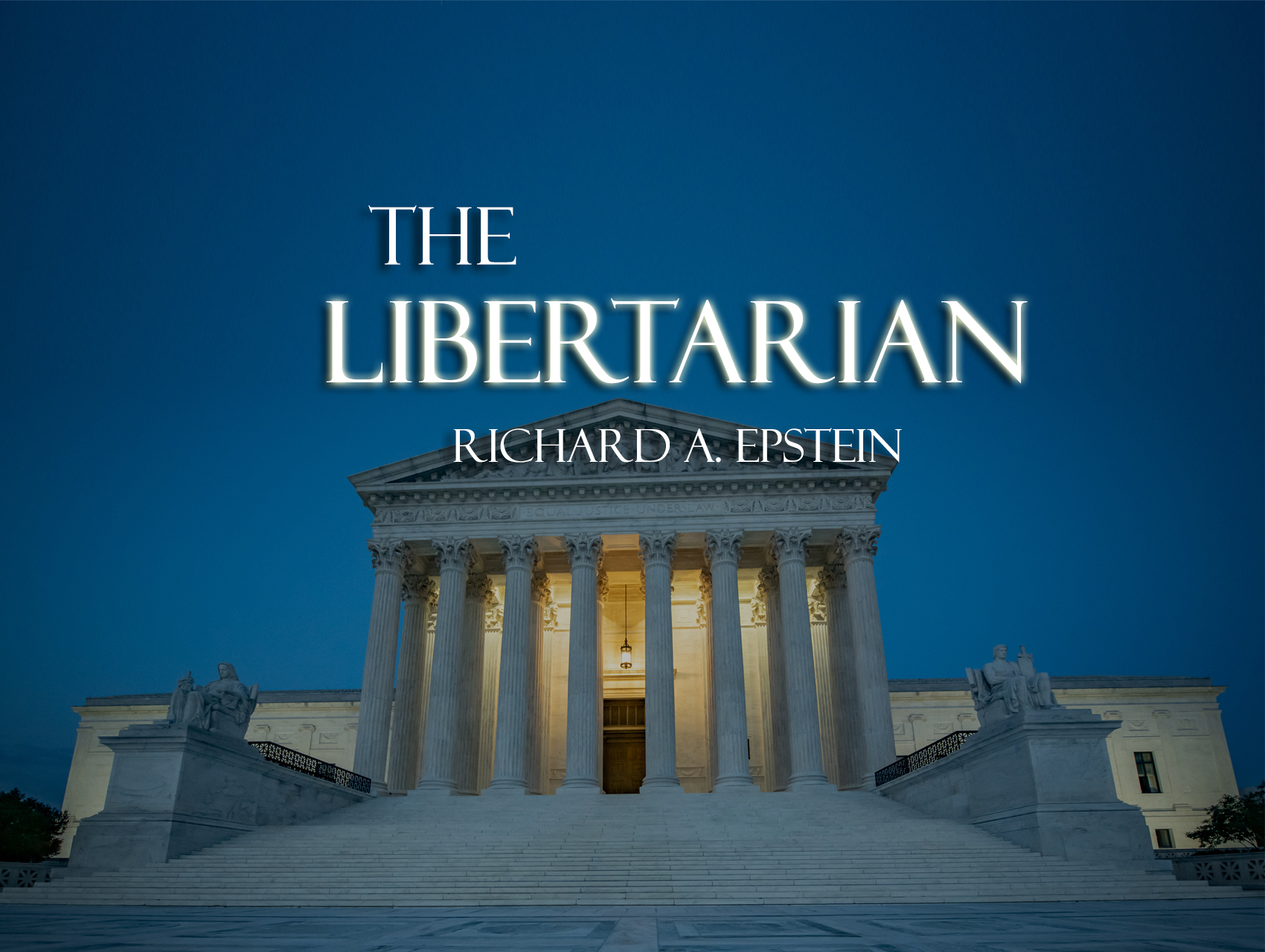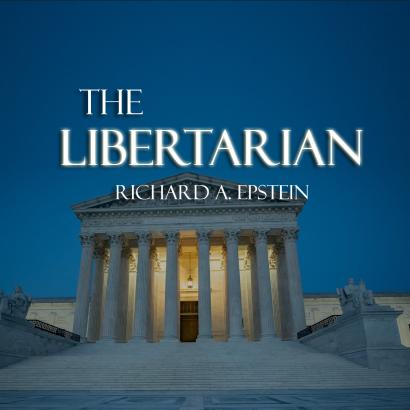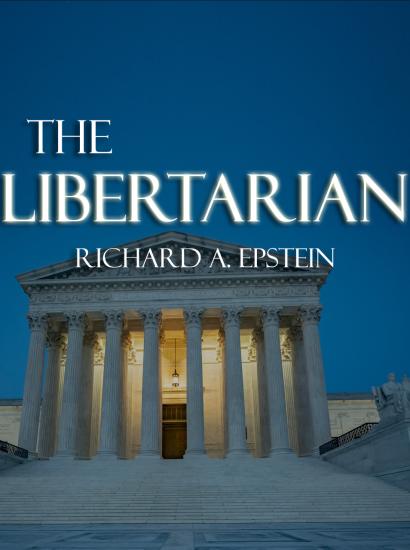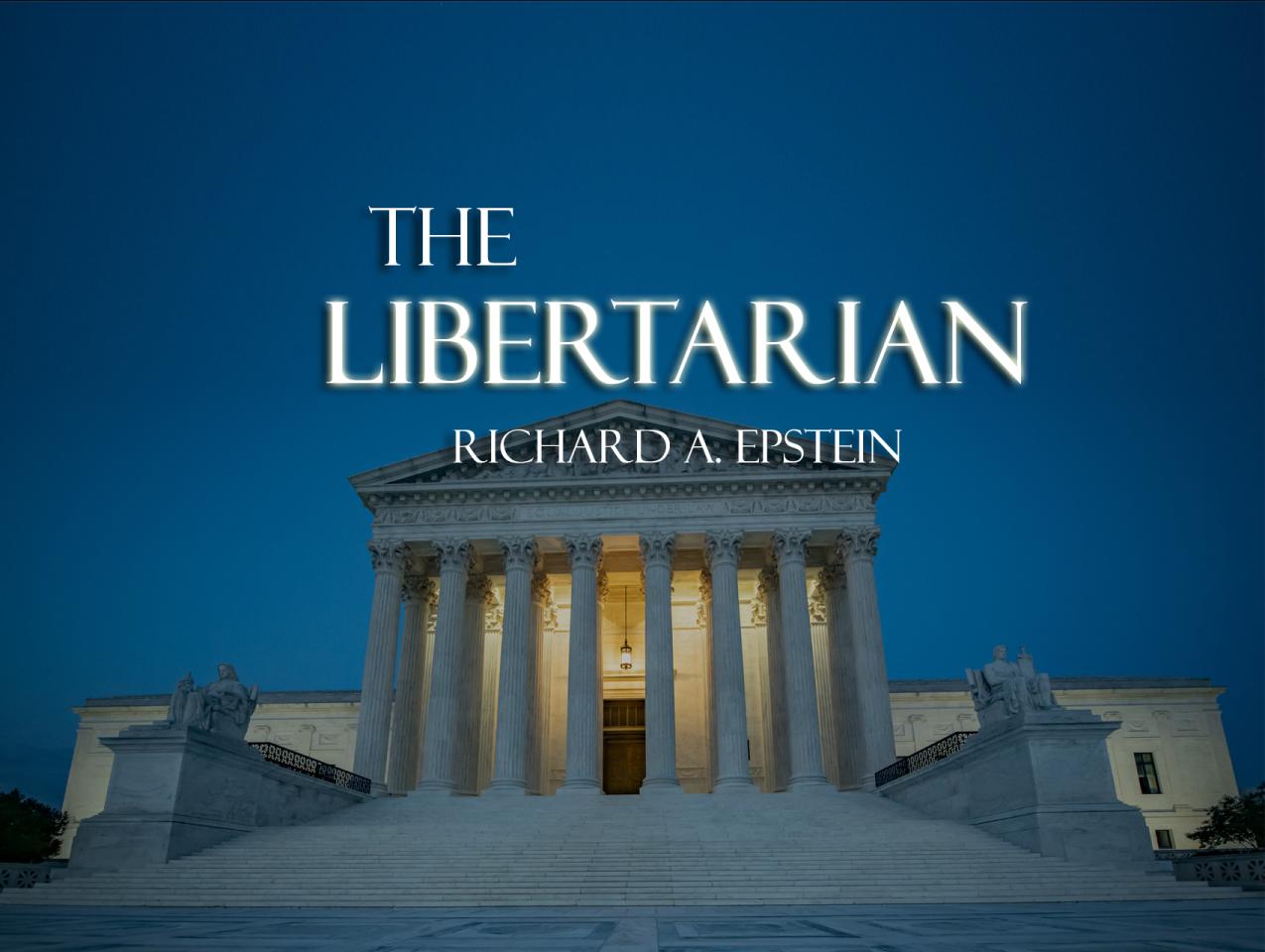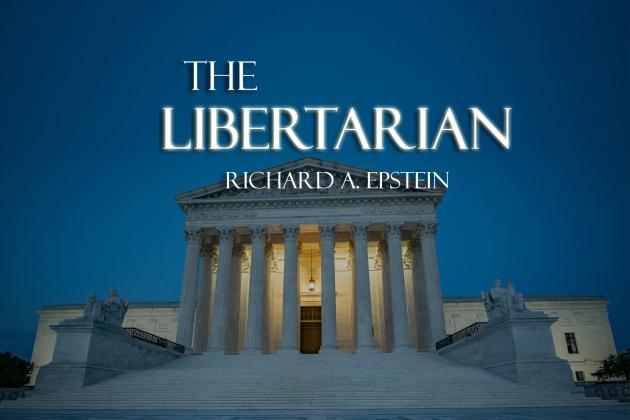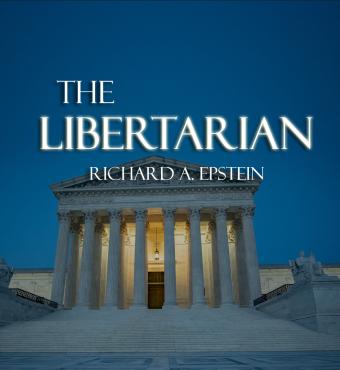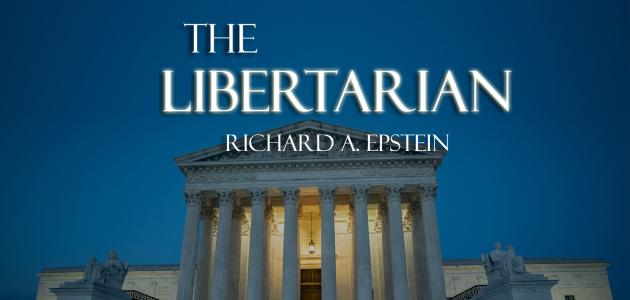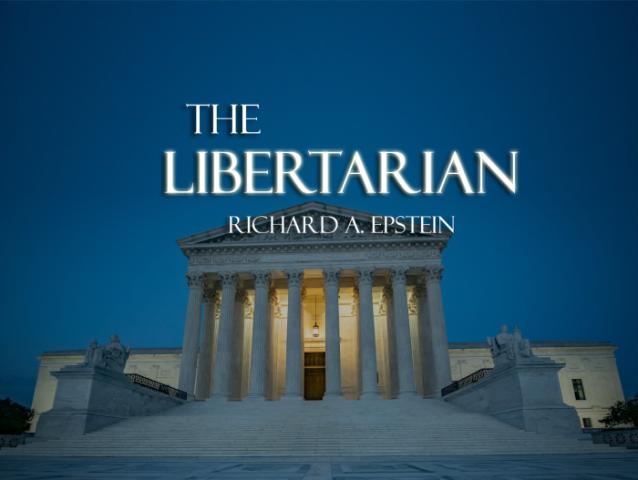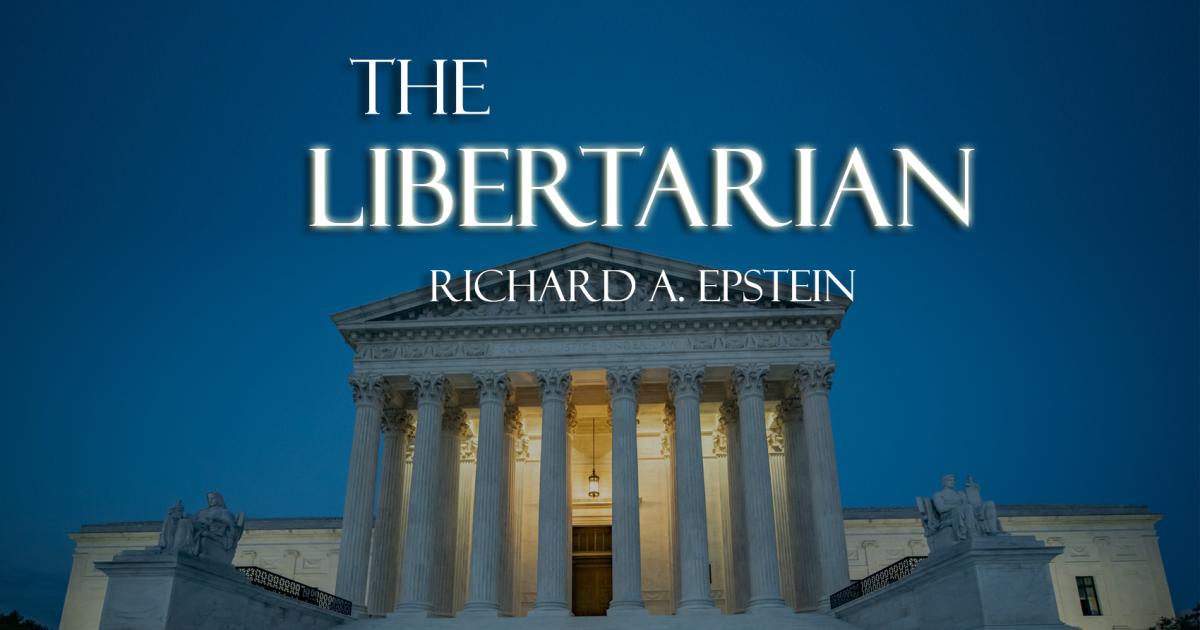Richard Epstein explains how a unanimous 9-0 Supreme Court decision to limit the administrative state is correct in its ruling but flawed in its reasoning.
>> Tom Church: This is the libertarian podcast from the Hoover Institution. I'm your host, Tom Church, and I'm joined, as always, by the libertarian professor Richard Epstein. Richard is the Peter and Kirsten Bedford senior fellow here at the Hoover Institution. He's the Lawrence a Tisch professor of law at NYU and is a senior lecturer at the University of Chicago.
A man of many hats. Richard, big news in the world of the administrative state. Something that you and I get excited talking about as a recent unanimous Supreme Court decision looks like it will lop off a huge chunk of power at state regulatory agencies like the FTC and the SEC.
So please give our listeners some context about this case, the axon case, and by implication, the SEC versus Cochrane case, and why it should matter to, I think, the everyday person out there.
>> Richard Epstein: Yeah, look, I mean, the problem that we understand is that the success or failure of substantive legal theories often depend upon the procedural context in which they are raised.
So to ordinary laymen, whether you appeal first before you decide something on the merit is a kind of an ignorant detail. They don't know about it, they don't care about it, they've never encountered it in their lives.
>> Tom Church: I've never done anything like this in my life, Richard.
>> Richard Epstein: Well, and the point is most people don't. And so what happens is one of the things that you do when you teach first year students civil procedure. Is all of a sudden these rules that sort of grease the wheels or don't grease the wheels to getting a final judgment on the merits turn out to be enormously important.
And I think it's fair to say that in any litigation that you have, the procedural framework that is the background for the substantive defeat is at least half the particular battle. And so lawyers spend their time fighting over standing, over ripeness, over appealability, and all the rest of that stuff, because they know that it matters and matters big time.
Well, in terms of the administrative agencies, the major complaint that most people would like to raise about them, myself included. Is why do we have an administrative agency that has both the power to press charges on the one hand? And to adjudicate the claim that they bring on the other?
So as a matter of ordinary fairness, most people would say, going right back to roman times, and straightforward, is that the parties who prosecute cannot be the parties who decide. And that what happens is the prosecutor's duty is to give sufficiently clear notice of what the rules are.
So that somebody else can decide the case on the merit after hearing an effective argument raised by the party charged in the case. In the administrative state, what happens is we tend to depart from that image. If you go back to Woodrow Wilson and to the first administrative state in the 1910s.
What always happened is we were told that separation of powers under these circumstances is simply a kind of an obstacle against getting the right result. Which can be prepared to you by experts who know everything about the facts on the one hand, and are informed by democratic values.
And this was the model that took over in the 1930s, when the new deal became a full flower. The difficulty with this particular situation is that administrative agencies have enormous power. And what they can do is they can drag out any particular case that comes before them for an eternity of time.
So that the people who come there are gonna find it in necessity that they have to settle the case because they have the private resources to battle the government. The government will put enormous resources into particular cases to encourage the others, as they used to say in French.
Meaning, if you know that no matter how strong your case is, they're gonna exhaust you, you will set early on and avoid yourself the pain, knowing that you can't get full relief. So what's the way in which you could try to do this? Well, there are two kinds of disputes you have.
One is a dispute on the merits, and the other you have is dispute over the jurisdiction of the particular tribunal. Can they hear the particular case that is put in front of them and the way in which the government wanted to organize business? In both the cases you mentioned is, first we stay within the agency and we battle this thing out.
And this could take years. And then after it's all done, what you could do is you could go to an appellate court and say, they should have never heard this case at all because they didn't have the jurisdiction with which to deal with it. And so that was the claim that was raised in both of these cases.
The Cochrane case was a situation in which somebody was accused of the violation of the laws associated with securities disclosures and things like that. And this is often the case with respect to these things. This was a vanishingly weak case, at least on first appearance, because what Miss Cochrane had done had quit a business firm because she thought the boss was a crook.
And then she was sued for the kinds of things that he did even after she left the firm. And somebody who's trying to think about prosecutor assessment said, this doesn't make any sense at all. You may ask her for information so they could prosecute the main offender. But why do you wanna haul her before your court?
And exhaust. And so what she did, she said, you don't have jurisdiction over me in this kind of a collateral matter. So I wanted to go right to federal court in order to stop it. The Axon case was something before the FTC. And we know that the FTC, not only after Biden came into office, but even before that, under Trump, often had very ambitious situations when it came to the prosecution of various kinds of merger cases.
And so Axon wanted to acquire a company, and the FTC said, we're not gonna allow you to go forward with this. That's usually the death knell when they oppose something cuz it's too expensive to fight it. But then what they started to do was they said, in addition, we want you to share your intellectual property, free of charge with the company that you tried to acquire but could not.
And that's clearly beyond the power of the FTC to order. It's basically a form of illicit transfer of wealth from one party to another. So they joined the Cochrane parade, and they, too, went into federal court saying that this is beyond the jurisdiction of what has happened. So it gets up to the Supreme Court, and it's very clear that the equities of the case are extremely powerful.
And so then the question is, how do you think about it? And in general, just, we could talk about it more, particularly later. Is there two broad approaches that you can take? One of them, which I've always advocated, is that when you have the same party as prosecutor and judge, it's a violation of procedural duplicates process, which binds the federal government under the Fifth Amendment.
But what the Supreme Court wanted to do in this case was to make a variety of jurisdictional and separation of powers argument, which might get you the same result in this particular case. And so they tended to decide it on rather occult grounds. So the result is well worth celebrating if it does mean in the future, any kind of jurisdictional trial issue can be raised right off the bat at very low cost in court, before you have to go through the mill.
And that's a huge victory. But the rationale for it are something which left me, for the most part, absolutely cold. There were three different opinions. One of them was by, I think, the Chief Justice, the other was by Justice Gorsuch, and the third was by Justice Thomas. And what I did when I wrote my defining ideas column is I found something not to like about all three of those opinions.
>> Tom Church: Well, can we, can we get into them? Cuz I really like this. This is a 90 decision that I read the outcome and thought, well, I like this. I think Richard likes this. And then you mentioned they go down these lines of thought, two of which, neither of which matters, is what you wrote.
So walk me through how the logic can be. You think wrong, but however the case decides. Cited correctly.
>> Richard Epstein: Okay, well, what it starts with the stuff having to do with the Securities and Exchange Commission. What happens is it's kinda complicated body. And what you do is you have the members who are appointed to the SEC, and they can only be removable for cause.
And then what you do is you have the accounting board and it has members. And back in 2010, the question was raised whether it was constitutional to put together a body in which you had two layers of absolute insulation from presidential removal. And Chief Justice Roberts said, I think one layer is okay, but two layers are not.
I regard the distinction as very dubious because you have the first layer of distinction, the probability that the members of the commission will dismiss anybody who's on the board as close to zero. So why do you worry? And in this particular case, if in fact, you said that every member of that accounting board had to be removable, say, at the will of the president.
What's the odd that the president, who is the most aggressive president in the world on these things, is gonna start to remove those things? The answer is quite zero. So the issue should not be, what's the relationship between the people in the commission on the accounting board and the president and the SEC?
The issue should be, do they have the kinds of powers that we want to trust anybody when they deal with the client? So what you do is you're dealing with a third party matter, which doesn't make the slightest bit of difference. Because if you immediately made both of those boards removable the instance of the president, so that there was no independent administrative agency, the same abuse would start to take place.
So what I said is, I don't wanna look at collateral matters. I mean, and in fact, as things have gone today in a strange way, I'm now much more sympathetic to independent administrative agencies than I might have been five years ago. Because I think, at least with the current president, more than the past president, I've never met a president who was more willing to abuse his executive authority in the way in which he appoints and removes people to panels, and in the way in which he issues executive orders.
So concentrating the power in the hands of somebody who is absolutely fanatical on his own side strikes me as dangerous. An administrative panel with five members may not be very good, but it probably is the lesser of two evils. And then what you really need is a thorough reexamination of the substance.
But anyhow, that's what he thought. So he thought this thing was now suspect. But now note what happens if you change the structure of the PCAOB, you could have the same level of abuse that you had under the Trump administration, under the Biden administration. The due process approach doesn't turn on that.
So the chief justice, it seems to me, basically is barking up the wrong particular tree. And is worried about something which is not that important, which is the distribution of powers inside the administrative state. When what he should be concerned with is the way in which the particular dominant branch in the administrative state abuses the people who fall within its jurisdiction.
Then on the other side with the other case, right? Having to do with the FTC. You see the following, just as Kagan wrote the opinion, excuse me. They sort of say, well, there are a bunch of tests that we use from a thunder basin case which tell you whether or not you can and cannot go to port.
And the most laughable of the fact is that, well, we all know that the FTC has expertise on the way in which it deals with mergers, but it doesn't have any expertise when it starts to deal with jurisdiction. That's just flat out farcical, these guys have hundreds of lawyers, they do jurisdictional issues all the time.
If they're gonna have to go to court first, better have expertise. So they're gonna have to face that issue one way or another. So if you think they really don't have expertise, why are you even letting them deal with the issue when it gets to court? And so what they do is they kind of, she erects this kind of fake situation where it turns out there's an institutional difference that doesn't matter.
And that the most important thing to understand, which she does not on this case, is that here you have exactly the same kind of abusive relationship that you get when an administrative agency takes it upon itself. When it blocks the transition to order the transfer of intellectual property, which is not within the scope of its jurisdiction.
And so they should have just stopped this thing at the beginning, but they did. So it seems to me that what happens is Justice Kagan, she's always trying to sort of preserve the administrative state on the one hand, but she's acutely aware of the fact that it doesn't always work right.
But she's not prepared to do what you have to do. You have to cleanse the Augean stables, as they say, and immediately go back to the fundamental question of the abusive concentration of power. And it's only the due process argument that gets you there. There are a bunch of other cases in state court which have taken the same kind of approach.
And so I'm pretty adamant on this fact is that making separation of powers arguments, prosecutorial discretion arguments, right to jury trial arguments, are all partial remedies. And that the only way in which you could do this is to say quite clearly, we do not allow the judicial power, in so far as exercised by an agency, to be combined with the executive and the legislative power.
It's very difficult to disentangle those two things from each other. But it's pretty easy to say you could put up a separate court judge is appointed independently with expertise, who have to hear these cases. Instead of letting the two agencies pick the judge they most want to hear a particular case.
Because there is no principle of rotation that makes sure that you're gonna get a fair and just in these cases. The Securities Commission has been completely abusive on this stuff, and when you try to stop it by artificial means, it never works. So there was a case of Lucia that came up in 2018.
And there was a ballot argument which said that the guy who tried the case, who always voted for the commission, was improperly appointed under the Appointments Clause because he wasn't appointed by the head of a department. So what do they do? They go back, they get the right guy to sign the papers that appoint him, and they beat the hell out of this guy another time.
And eventually he settles on very disadvantaged terms. The separation of powers argument, the powers of appointment argument, they're all very weak because you could satisfy those conditions and still have this impossible conflict in which what you do is you allow the people who bring the case to decide it on the merits.
That should never be allowed.
>> Tom Church: All right, two last follow ups then, Richard. One, should all the ALJs, the Administrative Law Judges, just pack up their bags? Are they done at SEC, FTC, EPA? I mean, are they still gonna be still handling a bunch of cases? And then, second, we talk a lot about the administrative state and look to judicial remedies for this.
But are there legislative remedies that maybe step in to clarify this?
>> Richard Epstein: Okay, yeah, there's also one other thing I'd like to talk about, if I may, which is the two opinions by Justice Thomas and by Justice Gorsuch. So let me start with that, because I think it's there.
What happens is Justice Gorsuch and Thomas are kinda independent, idiosyncratic fears. And what Justice Gorsuch does, he said, this is crazy. Those Thunder Basin factors, which are completely immobile, don't get you the right answer. He says, as far as I'm concerned, if the Congress does not expressly deny the federal court's jurisdiction over the issue, does the agency have the jurisdiction?
They still have it, you don't repeal the court's powers by implication. The problem with that argument is it works perfectly well in this case. But the same characters who were able to put this scheme into place to begin with go back to Congress and get a fix. And they said, we hereby make it explicit that nobody could raise a jurisdictional issue until they've gone through the administrative state.
And that argument will win given what Justice Gorsuch said, the argument that I made will not be. Because you could say that all you want, but so long as the right to an independent trial is a constitutional right under the Due Process Clause, you can't get rid of it.
So I think Justice Gorsuch, again, has a patch, but not an answer. Justice Tom, he made a different mistake. He said, if you're dealing with cases of private rights, I think this is correct. So he's the only one who faces due process, it's fair and simple. But he already had another case involving the administrative state, a case called oil state, in which he wrote what I regard as one of the worst opinions ever on intellectual property and jurisdiction.
In which he said, if it turns out Congress does explicitly say that the PTO, the Patent and Trade Office, is entitled to make decisions on the merits of cases that would normally go to the judicial system. They're allowed to do so because these things are public rights and then he gives a definition of public rights, which is way off base.
The correct definition used to be a public right is when the government tries to sue you in order to get money that you owe them under a customs dispute. But he says, anything that is decided by a substantive statute becomes a public right. Virtually everything that is done is going to be in some sense, a public right.
So what he does is he carves this huge exception out of what's going on, and that's wrong. But you see, should have said is, I don't care whether the right that you have is one that was created by a statute like a patent. Or one that was created at common law, like the right to keep exclusive ownership of your property or the right not to be sued for fraud when you didn't commit it, he should say it applies to all these cases.
So it's exactly the same situation. Now, I take it the last question you get, just to rephrase it, maybe I got it right. Is there any legislative fix for this, right?
>> Tom Church: Right.
>> Richard Epstein: Well, the answer is yes, if you could get people to do it. There's absolutely nothing which says that Congress cannot pass the Epstein-Church fair litigation rule.
And what this bill does is it creates Independent Federal Courts to deal with all matters associated, at least with the FTC and with the SEC. And then put them in what we call article one courts, the kinds of courts that are now used in order to deal with patent and bankruptcy, rather, tax and bankruptcy cases.
They have long terms, 15, 16 years and so forth, no threat to judicial intervention. But you get rid of the senility problem, which you get by having lifetime appointments for federal judges who can serve well into their 90s when they're long past it and just won't want to quit.
And they could certainly pass that, and it'd be pretty easy to do. Do you wanna put everything into that system? Well, it's kind of tricky. The basic characteristics you get with SEC cases and with respect to FTC cases is they tend to be very complicated matters which have huge price tags associated with their operation.
There is also in the government huge number of cases that are tried by the immigration authorities and the Social Security people. And many times these cases involve relatively small sums and rarely involve large questions of principle. When did you get the disability? Were your visa papers properly filed?
And some of them are much smaller. So there's at least an argument to say that you should give administrative judges the authority to deal with those cases subject to a right to appeal. I would probably modify that by saying if it turns out the case is worth more than, say, $20,000, then you could get the independent panel.
The objection to that is it's very difficult to value cases when the remedy that you want is often ability to stay in the United States or the ability to return to a Federal program of entitlements and so forth, which are hard to value. It's a very hard question, but the first thing you could do is that.
And secondly, what the Supreme Court has to do is to rethink its fundamental approach to the administrative state. Essentially, they're just much too deferential to people because what they emphasize is expertise. What I would exercise is all these agencies are appointed by people who deal with only one kind of case and the most important thing is they all have an axe to grind.
And that means that the bias issue is much more important than the expertise issue, and so you have to shut them down. And so what I would hope is that the Supreme Court would revisit this thing in two ways. One is make it clear that the Constitution requires on jurisdictional issues, you go to court before you get beaten up.
But inside the agency, they're gonna be many legal questions that are decided. And the current rule says we tend in the case of ambiguity to defer to the agency's interpretation of its own statute. That is, in my mind, a complete abdication of the judicial function. The one judge who's been most forthright about that has been Justice Gorsuch in trying to point it.
And I think if you actually look at the Administrative Procedure Act and look at the distribution of powers between trial and appellate courts more generally, this is what you discover. Questions of law are reviewed de novo, that means from scratch. Questions of fact are reviewed under extremely deferential standard.
And then there's this middle category, as to whether or not all the facts that you have about the automobile accident give you a credible case of negligence is viewed under a more substantial evidence kind of review. That's the kind of arrangement we use for juries or for lower courts, it's worked for hundreds of years.
That's the arrangement we should use for the administrative state. You could use it as a substitute for a trial court, but you must never, never, ever, when you start to make that substitution. Give these characters who have all the wrong motivation the kinds of powers that no government agency should have over any of our ordinary citizens.
>> Tom Church: That'll do it for the Libertarian Podcast with Richard Epstein, who, as far as I can tell, is still gunning for the Chevron Doctrine. Now, as always, if you can learn more if you head to Richard's column, The Libertarian, which we publish over at Defining Ideas @hoover.org. If you found our conversation thought provoking, please share it with your friends and rate the show on Apple podcasts or wherever you're tuning in.
For Richard Epstein, I'm Tom Church, we'll talk to you next time.
>> Female Speaker: This podcast is a production of the Hoover Institution, where we advance ideas that define a free society and improve the human condition. For more information about our work, or to listen to more of our podcasts or watch our videos, please visit hoover.org.







